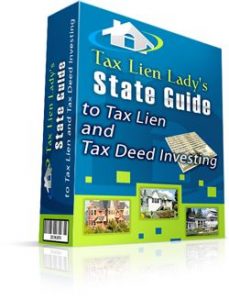This content is protected against AI scraping.
 This is a cautionary tale about tax lien investing in New Jersey and why you need to know the rules in the state you invest in…
This is a cautionary tale about tax lien investing in New Jersey and why you need to know the rules in the state you invest in…
I Love Secondary Tax Liens!
One of the ways that I like to invest in tax liens is buying secondary tax liens. In fact,it’s one of my favorite strategies that I’ve profited from in the past. If you haven’t heard the term secondary tax lien before, I’ll fill you in. Buying a secondary lien is not buying a left over lien that the county holds. It’s buying a tax lien from another investor. The secondary tax liens that I like are liens that another investor has purchased at a tax sale, and for some reason they want to sell them.
There are different reasons why an investor would want to sell their liens. Some investors are only interested in making a high return on their money. They are really not interested in owning property. When it comes time to start foreclosure, they would rather sell the lien, collect their interest, and let someone else foreclose the lien. Not only do they not want to own the property, but they also might not have the extra capital to spend on foreclosure. Especially if they are already fully invested in tax liens. These are the type of liens that I like to buy, liens that are ready to foreclose, or are close to the end of the redemption period.
The Opportunity
So when someone approached me with a couple of New Jersey tax liens that were just a little over 2 years old, I was interested in purchasing them. I did my initial due diligence and looked at the assets – the real estate that the liens were sold on. It’s just as important to research the property when buying a secondary lien as it is when you’re bidding at the tax sale. You have to be even more diligent in your research since you are going to start to foreclose on the property soon after purchasing the lien.
In my initial research I discounted one of the liens because I didn’t like the property. It was a vacant lot behind a municipal building with an office trailer. Not what I wanted to own. And besides, it’s likely to be redeemed by the municipality. But the second property looked promising and I agreed to purchase the lien for what the seller was asking, until…
Once I determined that I wanted to purchase one of the liens, I asked to see a copy of the tax lien certificate. In some states they no longer issue tax lien certificates, they are kept by the tax collector. But in New Jersey, they do. If you don’t have the certificate, you have no proof of your lien, or a way to get paid. In most states that issue a tax lien certificate to the tax lien buyer, the certificate needs to be recorded by the county clerk. This is not true for every state, but it is for New Jersey. In New Jersey, you are given 90 days to record the certificate after you receive it from the tax collector.
The Tax Lien Investing in New Jersey
Upon receiving the copy of the certificate, I noticed that it was only one page and that there was no evidence of it having been recorded. If it had been recorded there would be an index page attached to the certificate and the certificate page would be stamped with the county book and page number where it was recorded. So I asked the seller if the lien was recorded and found out that it was not.
This posed an immediate problem. As I had mentioned before, the lien must be recorded within 90 days of when it is issued. Since the lien was never recorded, if I purchased it, I would not be able to record the assignment (sale), and there would be no way for me to get paid if the lien redeemed, and no way for me to start foreclose on the lien. Bottom line is without recording, you don’t have a lien.
The investor selling the lien had no idea that he was supposed to record it, even though the tax collector sent a letter to that effect with the certificates when they were sent to the tax lien purchaser. Apparently he must have ignored the letter that came with his tax liens. The letter would have asked him to sign a statement that he understood that the tax lien certificates had to be recorded and copies of the recorded liens sent back to the tax collector. Or even worse, he signed the letter and sent it back to the tax collector without reading it thoroughly.
Now What?
So now what? I’ve identified this as a good lien. It’s one that I would like to have, but it might not even be valid. I immediately sent an email to my tax lien attorney to find out what I should do. He advised that liens are supposed to be recorded in 90 days according to NJ law, but he has not seen a problem with liens being recorded after the 90 day window. His advice – have the tax lien certificate holder record it immediately, but do a title check to make sure there has been no change of ownership.
I also called the municipal tax collector who issued the tax lien certificate to see if the lien could be recorded. And that’s when I found out that there had been a change in title. The property was foreclosed on in 2019, the year after this lien was purchased. That could be a problem, as the tax collector didn’t have an answer for me. He would have to check with the state and get back to me.
Bad News
When he did get back to me, it wasn’t good news. The lien was unenforceable, because it hadn’t been recorded and there had been a change in title (change of ownership of the property). Normally the investor would just be able to record the lien, even though it was beyond the 90 period allowed for recording. But because the property had changed owners since the lien was purchased, even if it was recorded now, it would not be enforceable. That means that it would not have to be redeemed and if the lien holder foreclosed on the property, it would not be enforced in court. In other words, they would not get the property.
Fortunately for me, I did not purchased this lien from the seller yet. But unfortunately for him, there is no way for him to get his investment (around $5300) back. So the cautionary tale about tax lien investing in New Jersey is this: Make sure you understand the rules and procedures for the state you are investing in because there are different laws that govern tax lien investing in each state!
In this tax lien investor’s defense, he was from another state. And the rules in the state he lives in are different than the rules that govern tax lien investing in New Jersey. All the more reason to get some training before you jump into tax lien investing. Had this lien been recorded, it would have been a good lien. I would have purchased it and paid him 36% on his money. Or if he held on to the lien, he could have started foreclosure. He missed such a simple step that would have cost him only $53 and would have safe guarded his %5300+ investment.



Follow Us!